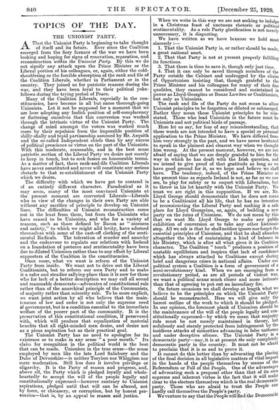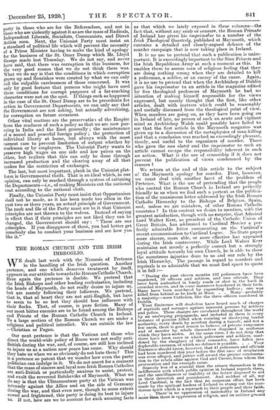TOPICS OF THE DAY.
THE UNIONIST PARTY.
ATlast the Unionist Party is beginning to take thought of itself and its future. Ever since the Coalition emerged from the fiery furnace of the war we have been looking and hoping for signs of renovation, reparation, and reconstruction within the Unionist Party. By this we do not signify any attack upon the Prime Minister or the Liberal portion of his colleagues, or, again, either the cold- shouldering or the forcible absorption of the rank and file of the Coalition Liberals, whether in Parliament or in the country. They joined us for patriotic reasons during the war, and they have been loyal to their political yoke- fellows during the trying period of Peace.
Many of the Coalition Liberals, especially in the con- stituencies, have become in all but name thorough-going Unionists. Let it not be supposed for a moment that we are here adopting any foolish position of self-complacency or flattering ourselves that this conversion was worked through the intrinsic virtue of the Unionist Party. The change of mind amongst the voters was worked much more by their repulsion from the impossible position of shilly-shally and tepid partisanship assumed by Mr. Asquith and the so-called Independent chiefs than by any excess of political prescience or virtue on the part of the Unionists. With this moderate, reasonable, and in the best sense patriotic section of the Liberal Party we desire not merely to keep in touch, but to seek fusion on honourable terms. As a matter of fact, these rank-and-file Coalition Liberals have never constituted and never will constitute any serious obstacle to that re-establishment of the Unionist Party which we desire.
The difficulty with which we have got to contend is of an entirely different character. Paradoxical as it may seem, many of the most convinced Unionists at the present moment are converted Liberals—Liberals who in view of the changes in their own Party are able without any sacrifice of principle to develop on Unionist lines. The difficulties of Unionist reconstruction come not in the least from them, but from the Unionists who have ceased to be Unionists, and who for a variety of reasons, such as those defined by Bacon as " niceness and satiety," to which we might add levity, have adorned themselves with some of the cast-off clothing of the senti- mental Radicals. The tolerati on of murder and anarchy and the endeavour to regulate our relations with Ireland on a foundation of pretence and sentimentality have been due to diluted Unionism rather than to any effort by Liberal supporters of the Coalition in the constituencies.
Once more, what we want is reform of the Unionist Party from inside. We want not to drive out the Liberal Coalitionists, but to reform our own Party and to make it a safer and steadier rallying-place than it is now for those who for lack of a better description we may call all sound and reasonable democrats—advocates of constitutional rule rather than of the anarchical principle of the Communists, of majority rather than minority rule. To be more explicit, we want joint action by all who believe that the main- tenance of law and order is not only the supreme need of government, but is a condition essential to the immediate welfare of the poorer part of the community. It is the preservation of this constitutional condition, if persevered with, which will produce that equalization of material benefits that all right-minded men desire, and desire not as a pious aspiration but as their practical goal. The Unionist Party has no need to apologize for its existence or to make in any sense " a poor mouth." Its claim for recognition in the political world is the best that can be made. Unionism in the true sense—the sense employed by men like the late Lord Salisbury and the Duke of Devonshire—is neither Toryism nor Whiggism nor mere moderation. Still less does it involve privilege or oligarchy. It is the Party of reason and progress, and, above all, the Party which is pledged loyally and whole- heartedly to accept the will of the people legally and constitutionally expressed—however contrary to Unionist aspirations, pledged until that will can be altered, not by force, or chicanery, or corruption, but by honest per- suasion—that is, by an appeal to reason and .justice. When we write in this way we are not seeking to indulge in a Christmas feast of unctuous rhetoric or political sentimentality. As a rule Party glorification is not merely unnecessary, it is disgusting. We have written as we have because we hold most sincerely :- 1. That the Unionist Party is, or rather should be made, a great national asset.
2. That that Party is not at present properly fulfilling its functions.
3. That there is time to save it, though only just time. 4. That it can only be saved through members of the Party outside the Cabinet and undrugged by the elixirs of Opportuniam insisting that, though grateful to the Prime Minister and his colleagues for many of their fine qualities, they cannot be considered and maintained in power as Lloyd-Georgites or Boner Lawites or Coalitionists, but only as Unionists.
The rank and file of the Party do not mean to allow Unionist principles to be forgotten or diluted or submerged. Rather they mean those Unionist principles to be rein- stated. Those who lead Unionists in the future must be Unionists and not political birds of passage.
Here let us say, for fear of any misunderstanding, that these words are not intended to have a special or personal application to the Prime Minister. We have differed from him very strongly in the past, and we have never hesitated to speak in the plainest and clearest way when we thought him wrong. At the present moment, however, we are not afraid of saying that we are deeply grateful to him for the way in which he has dealt with the Irish question, and we intend to give proof of that gratitude so long as we have good ground for it, as we hope and believe we shall have. The tendency, indeed, of the Prime Minister at the present time as regards Ireland is not, as far as we can see, to play for safety or to coquet with Liberalism, but to throw in his lot heartily with the Unionist Party. We trust we are right in this supposition. If we are, Mr. Lloyd George should demonstrate that he does not mean to be a Coalitionist all his life, that he has no intention of reconstructing the Liberal Party and making it a safe place for Lloyd Georgeism, or, again, of building a new party on the ruins of Unionism. We do not mean by this that we want Mr. Lloyd George to make any public exhibition of conversion or to take any other histrionic step. All we ask is that he shall neither ignore nor forget the essential principles of Unionism, and that he shall abandon altogether the idea of maintaining a kind of balance in his Ministry, which is after all what gives it its Coalition character. The Coalition " touch " produces a position of unstable equilibrium and inspires that lack of confidence which has always attached to Coalitions except during brief and dangerous crises in national affairs. Under our political system a Coalition is a form of government of a semi-revolutionary kind. When we are emerging from a revolutionary period, as are all periods of violent war, we want a political nexus much closer and more intimate than that of agreeing to put out an incendiary fire. On future occasions we shall develop at length what we believe to be the principles on which the Unionist Party should be reconstructed. Here we will give only the barest outline of the work to which it should be pledged. In our opinion, the foremost plank of Unionism should be the maintenance of the will of the people legally and con- stitutionally expressed—by which we mean that majority rule must be not merely maintained in theory, but sedulously and sternly protected from infringement by the insiclious attacks of minorities advancing in false uniforms and under deceptive aliases. The Unionist Party is a democratic party—nay, it is at present the only completely democratic party in the country. It must not be afraid to proclaim that it is so and to prove it. It cannot do this better than by advocating the placing of the final decision in all legislative matters of vital import in the hands of the people themselves by means of the Referendum or Poll of the People. One of the advantages of advocating such a proposal other than that of its own supreme and inherent virtue is the fact that it will make clear to the electors themselves which is the real democratic party. Those who are afraid to trust the People can hardly call themselves the People's party. We venture to say that the People will find the Democratic party in those who are for the Referendum, and not in those who are violently against it as are the mass of Radicals, Independent Liberals, Socialists, Communists, and Direct Action men. Next, the Unionist Party must insist on a standard of political life which will prevent the necessity of a Prime Minister having to make the kind of apology for the business of the St. Omer Dump which Mr. Lloyd George made last Thursday. We do not say, and never have said, that there was corruption in this business, for the very good reason that we do not think there was. What we do say is that the conditions in which corruption grows up and flourishes were created by what we can only call the culpable carelessness of those concerned. It was only by good fortune that persons who might have used these conditions for corrupt purposes of a far-reaching character were not on the spot. If things such as happened in the case of the St. Omer Dump are to be precedents for action in Government Departments, we can only say that the Government are not asking, but actually advertising, for corruption on future occasions.
Other vital matters are the preservation of the Empire from the madness of such a policy as that we are now pur- suing in India and the East generally ; the maintenance of a sound and peaceful foreign policy ; the protection of individual liberty at home, but always with the most earnest care to prevent limitation of output whether by workmen or by employers. The Unionist Party wants to preserve high wages on one side and low prices on the other, but realizes that this can only be done through increased production and the clearing away of all that makes for the restriction of exchanges.
The last, but most important, plank in the Unionist plat- form is Governmental thrift. That is an ideal which, in our opinion, can only be reached through a system of rationing the Departments—i.e., of making Ministers cut the national coat according to the national cloth.
Finally, the Unionist Party must insist that Opportunism shall not be made, as it has been made too often in the past two or three years, an actual principle of Government. The rank and file of the Party must see to it that Unionist principles are not thrown to the wolves. Instead of saying in effect that if their principles arc not liked they can be changed, the Government should say : " These are our principles. If you disapprove of them, you had better get somebody else to conduct your business and see how you like it."



































 Previous page
Previous page